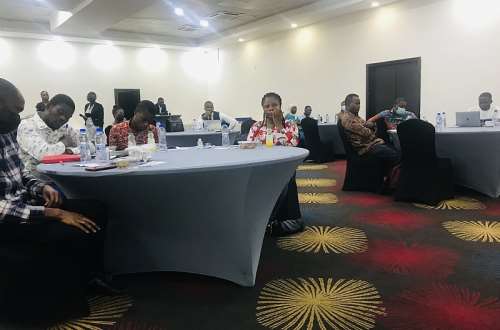The Financial Intelligence Center (FIC) has charged journalists to engage in investigating economic and financial crimes reporting in order to protect the country against the dangers of the proceeds of crimes.
Mr. Seth Nana Amoako, the Head of Compliance Unit at the Financial Intelligence Centre (FIC), stated that media practitioners, particularly investigative journalists, play a crucial role in uncovering corruption, promoting good governance, and sensitising law enforcement authorities and the public to the fight against financial and economic crimes.
It is against this background that the FIC called for constant engagement with the media to take interest in and have a need for more productive collaboration as they constitute one of the main sources of information and intelligence.
He stated that since the establishment of the Intelligence Centre, it has undertaken training and sensitisation activities especially for media, civil society organisations, youth and religious leaders to foster understanding of the fight against money laundering and the financing of terrorism.
He stressed the need for all stakeholders to be actively involved in the prevention of such crimes.
Mr. Amoako, therefore, stressed the need for persons in doubt of others financial actions to ask questions and if suspicious, report the suspicious activity “in order to create a safe and better world.”
The training was aimed at encouraging the media to internally nurture the culture of such investigation and to strengthen the network of journalists to explore more effective ways of disseminating information on anti-money laundering and counter financing of terrorism regimes.
Furthermore, the workshop was designed to help FIC to forge a solid alliance with the media in a concerted manner for the effective dissemination of information on crime related issues; keep the media informed on national initiatives, particularly FIC’s mandate; and provide an opportunity for trained journalists to acquire techniques in information gathering and investigation.
The training which was held at the Alisa Hotel was also aimed at raising public awareness and political commitment to anti-money laundering and anti-corruption in Africa.
It was also sought to equip journalists to ensure in-depth reporting on the menace of money laundering and terrorism financing in Ghana and how to tackle them and their related issues.
The Deputy Manager of FIC, Sean Henry Osei, on his part disclosed that prior to the enactment of the anti-money laundering act (ACT 749) in 2008, money laundering was not an offence adding that before a person could be arrested or accused of money laundering, there was the need to first establish a documentation that proves there was a criminal activity.
Investigative journalist Manasseh Azure, in his turn, encouraged his colleagues to utilize investigative skills in unearthing stories about money laundering and terrorism and their financing adding that, journalists should adopt best strategies to unearth stories that ordinarily they may not have seen with their naked eyes.
He again urged the participants to be actively involved in the program and also employ the knowledge they would acquire at the end of the training.
“As good journalists, it’s important to use our investigative skills in dealing with matters regarding money laundering and terrorism and it’s financing. Such training is very useful in the exercise of our work as journalists. I have learnt many things many I didn’t know. So encourage all of us to be interactive and learn from this very important Program,” Manasseh Azure said.
The Financial Intelligence Center (FIC) serves as the National Center for the receipt and analysis of suspicious transaction reports and other information relevant to the predicate crimes of money laundering, terrorism financing, and proliferation financing (ML/TF & P), as well as the dissemination of actionable intelligence to competent authorities.




Comments are closed.